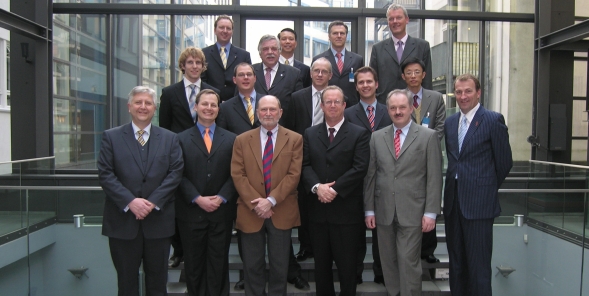
THE CONTAINER TERMINAL BENCHMARKING GROUP
The Container Terminal Benchmarking Group is a member-based benchmarking group made up of a collaborative of organizations, working to enable the delivery of quality container terminal services in a cost-effective and efficient manner through the adoption of quality systems and standards. The committee is comprised of container terminal operators, port authorities’ suppliers, technology companies, industry associations, and governmental entities. By working together, members of the Committee are accelerating the adoption of uniform standards and practices, which will help to organise complex processes in an efficient and effective way in order to find the best ways to capture value for their customers and address the concerns of stakeholders. Widespread use of these standards will ultimately reduce costs and improve the container supply chain.
Member companies and their representatives have a deep level of subject matter expertise relevant to the groups stated goal and hold positions of authority within their organizations. Committee members are experienced executives who hold positions of influence in their respective organizations and who have a high-level understanding of container terminal operation and its associated issues.Joining the Committee allows your organization to participate in the selection and implementation of standards that can transform the industry globally. Membership empowers you to apply your organization’s knowledge to enable the delivery of quality container terminal services and to become a force in the future of the industry. Group members, through their participation are providing their expertise to move the industry to adopt quality systems and standards that meet the industry’s needs. The Committee convenes in quarterly, face-to-face meetings, with additional interim teleconferences as needed. Interim communication takes place via email and web-based tools.


Dr. Kenneth Tse
YICT(retired)


Mr. Joe Ruddy
President & CEO
Virginia International Terminals


Mr. Lawrence Ni
China Merchant Group Hong Kong


Prof. Gustaaf de Monie
Port & Shipping Advisor
International Port Consulting

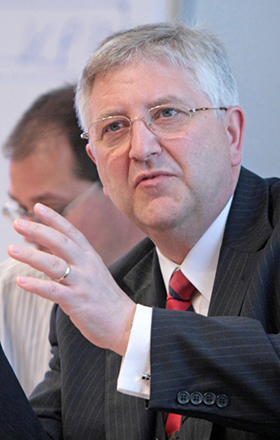
Mr. Bernhard Staender
Managing Director
Germanischer Lloyd


Mr. Aleksandr Artjomov
Director
Visy UK Ltd
[expand title=”Read On” swaptitle=”Close”]


Dr.-Ing. Yves Wild
Managing Director
Dr.-Ing. Yves Wild Ingenieurbüro GmbH


Mr. Heinrich Goller
Managing Director
HHLA Container Terminals GmbH


Mr. Jorg Gregor
CTQI Manager
HHLA


Mr. Marcus Leaver
Director Global Seafreight HQ
Hellmann Worldwide Logistics


Mr. Mark Trundle
International Logistics Manager
Kingfisher


Mr. Neil Wiggins
Chairman
National Maritime Development Group

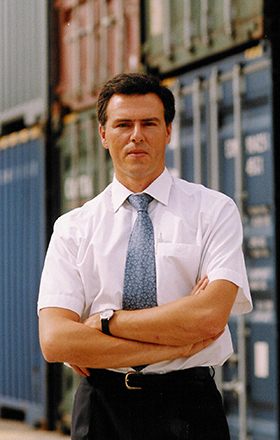
Mr. Rafael Sapina
Director for Shipping and Port Operators
Fundacion Valenciaport


Mr. Simon Shore
Managing Director
Cirrus Logistics

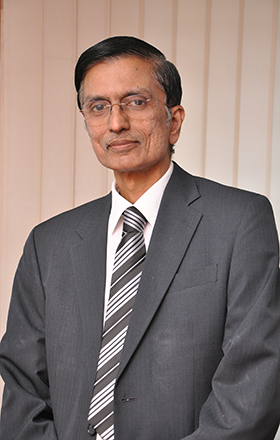
Mr. S.N. Srikanth
Sr Partner
Hauer Associates

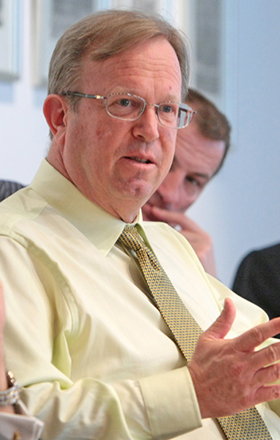
Mr. Steve Longbotham
Consultant
Integrative Concepts


Capt. Wilmer Aguilar
Executive Director
Global Institute of Logistics

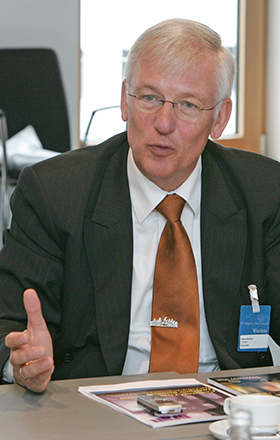
Mr. Harry Mohns
Retired
Formerly Eurogate


Mr. Wolf von der Mosel
Head of Maritime and Hinterland Logistics
Hamburg Port Authority


Mr. Edmond Leung
CIO
Hutchison Port Holdings


Mr. André Gründel
Senior Manager International Shipping and Ports
Nordex Energy GmbH


Ms. Christel Costagli
Head of Procurement Sustainability
SABMiller

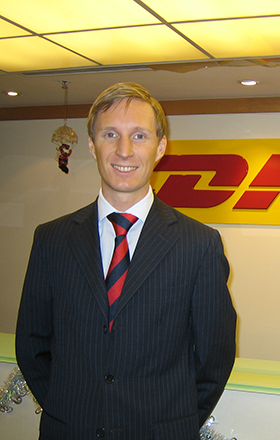
Mr. Clas Thorell
Senior Vice President, Global Head of Ocean Freight LCL
Panalpina

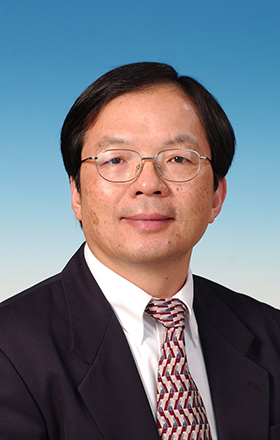
Dr. Chung-Yee Lee
Head Prof. Industrial Engineering & Logistics Mgmt
Hong Kong University of Science & Technology


Ms. Elizabeth Hu
Trade Manager
CSAV


Mr. Frank Kho
Head Container Operations
PSA-HNN (Hesse Noord Natie)

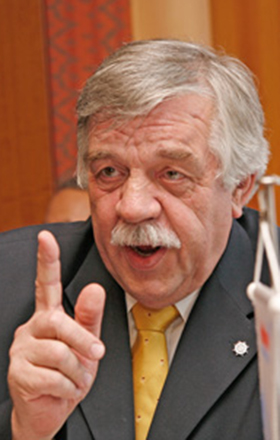
Mr. Fer van de Laar
Managing Director
IAPH
[expand title=”Read On” swaptitle=”Close”]

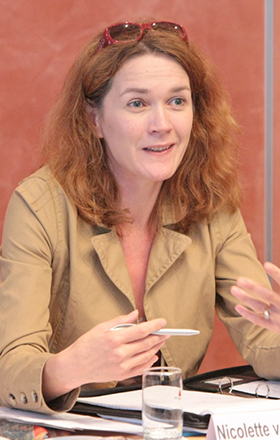
Ms. Nicolette van der Jagt
Director General
CLECAT


Mr. James McCormick
Industry Expert
Formerly Taranto Container Terminal & YICT

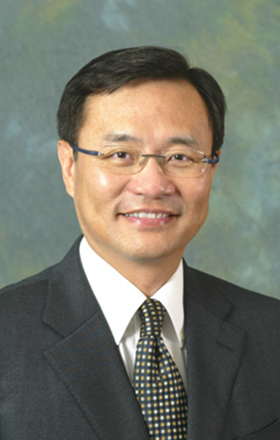
Mr. John Kok
General Manager – CSI
Hutchison Port Holdings


Mr. John Wheeler
Vice President, Carrier Sales
South Carolina Ports Authority


Mr. Nicolas de Loisy
Partner
SCMO – Supply Chain Management Outsource


Mr. Stefan Duehring
Manager Operations and Consortia, Asia
Hamburg Süd

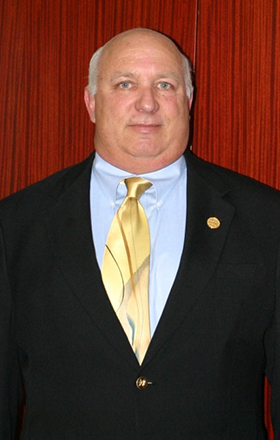
Mr. Todd Jones
Director, Trade & Development
Alabama State Port Authority
GUSTAAF DE MONIE IS THE EXPERT ADVISOR TO THE COMMITTEE
In 2006 the Institute approached Dr Gustaaf de Monie, author of UNCTAD’s “Manual on a Uniform System of Port Statistics and Performance Indicators” and asked him to act as expert advisor to the Container Terminal Benchmarking Group in its quest to developing a quality system and standard for the industry.His initial reaction is summarised in the following extract from a speech he gave in Antwerp in 2006 at an Institute dinner to discuss the proposal.
“I think for many years we have been dealing with the issue of performance indicators for container terminals. We have done that in many various projects and each time we are facing the problem that the data collected by the various parties is not reliable, cannot be compared, it is not relative to what we are looking for and at the end of the day what we find is that everybody is circulating data that is of absolutely no use to the logistics community. Its’ only for some use for the person that is circulating the data because it’s just public relations. What you find typically is that they say “oh we have been doing 25 containers per hour” while we do not know whether that is true, we don’t know how they measured it, we don’t know whether there were 35 containers per hour during one hour or whether they were doing that for a shift or whether they are doing that vessel after vessel after vessel. What we find is that when you go to conferences where all our terminal operators are present, its like going into the pub after a day of fishing where the fishermen get together and say “my fish is bigger” and “my fish is biggest” and “no no my fish is still bigger” and you get the one with the biggest arm length having caught the biggest fish.
DR. GUSTAFF DE MONIE EXPLAINES CTQS
It’s a little bit the same with terminals. So that’s the idea maybe we need to do a little bit more about developing this lets say performance indicators or performance measurements for container terminals. Now with one of my very best friends and colleagues Dr. Brian Thomas, who was once a lecturer in Cardiff University, we were asked by the ILO in a program that is called Port Worker Development Program to develop specifically three units that had to do with performance measurement. This is part of a bigger program that contains about 30 modules that were made also to inform people about container terminal operators and to train the supervisory levels and below. So we made this program for supervisory levels and below.
But to our big surprise I have been using that program for the last ten years in academic circles for people that come to university and are taking courses on for example shipping and port management. The biggest disappointment is that although now we have a program with a certain amount of definitions what we find is that individuals are still using it as they like it. They use certain parts, they change the definitions if they do not like the definitions and at the end of the day we are back to square one. So that’s the situation. And I’m a bit afraid that if it goes on like this we’ll never know what are the good terminals and what are the bad terminals.
THE CONTAINER TERMINAL QUALITY SYSTEM DEVELOPED BY THE GROUP
The “Container Terminal Quality System” (CTQS) is a major accomplishment for the shipping world. This system was developed as the result of an unprecedented global collaborative effort of a variety of peer groups with one common goal: To make container port performance more transparent. By developing indicators as a means of quantifying and comparing terminal quality, the authors of the standard, members of the Institute’s Container Terminal Benchmarking Group created a basis for assessing container port performance.
Competition is tight and container markets are emerging quickly. Time is scarce and your customers cannot wait for an expansion of your physical terminal capacity to resolve growing demand. It is time to act in order to avoid all collateral congestions effects: loss of time, frustration, long waiting-hours for ships and trucks, which ultimately leads to unhappy customers. There is abundant room for improvement.
MORE ABOUT THE CONTAINER TERMINAL QUALITY SYSTEM (CTQS)
